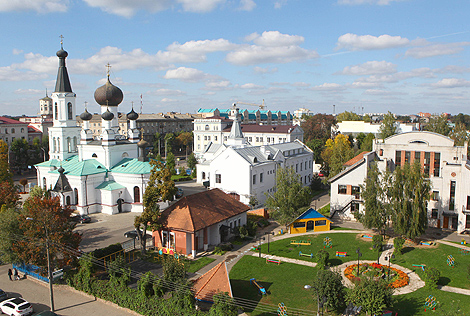Press releases
Experts from 18 countries discussing green solutions for Mogilev
 MOGILEV, 20 August (BelTA) – The NEXT summer school Nature-Based Solutions for Smart Cities is taking place at the Mogilev-based Belarusian-Russian University, BelTA learned from Doctor of Sciences in Biology, head of the Life Safety Department at the university Alexander Shchur.
MOGILEV, 20 August (BelTA) – The NEXT summer school Nature-Based Solutions for Smart Cities is taking place at the Mogilev-based Belarusian-Russian University, BelTA learned from Doctor of Sciences in Biology, head of the Life Safety Department at the university Alexander Shchur.
Taking part in the summer school are 46 undergraduate and post-graduate students, scholars and community leaders from 18 countries: Belarus, Russia, Germany, Czechia, Hungary, Vietnam, Mongolia, India, the United States, Canada, Ukraine, Moldova and other states. A total of nearly 200 applications were submitted. The participants will communicate in English. Among the coaches are experts from the Netherlands, Italy, Sweden, Hungary, Slovakia, Russia, Estonia, Czechia, Belarus, Poland and Germany.
It is noteworthy that the majority of the summer school participants are not students, but experienced and successful professionals with academic degrees. The summer school provides an excellent opportunity to communicate best practices. There is no distinctive border between students and teachers: both of them expect to learn many new things. The international team of experts does not only discuss modern theories and concepts related to the development of green infrastructure and urban and peri-urban landscapes, but also seeks to tackle specific issues related to the development of green patches of Mogilev.
The participants of the summer school are to come up with innovative and eco-friendly solutions to promote the city’s green infrastructure network, in particular in the area of Pechera Lake, Podnikolie, Buinichi, and the Dubrovenka River basin. The participants of the summer school have already embarked on exploring these areas. “We do not expect the participants to roll out thoroughly elaborated and ready-to-use ideas and projects. The very opportunity to discuss the city’s issues with such a multinational team and to have a look at them from outside is valuable,” Alexander Shchur said.
The results of the research will be available to designers, local authorities and the general public. The findings of the research can come in handy while implementing various local projects aimed at expanding green areas, increasing the convenience of the city life and improving the environmental situation in the city. The summer school will run till 26 August. The project is co-organized and co-funded by a consortium of international partners, including Erasmus+, Visegrad International Foundation, the German Academic Exchange Service (DAAD), and ERA-NET Cofund Smart Urban Futures.







 print version
print version make home page
make home page add to bookmarks
add to bookmarks

